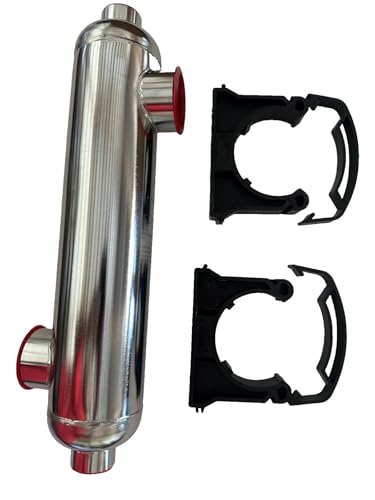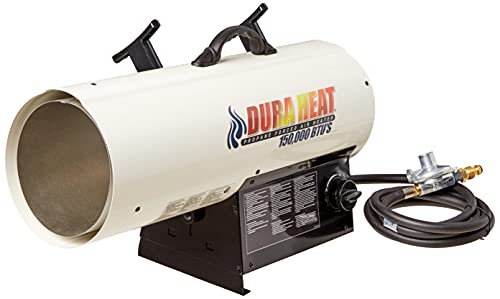Finding a heater solution near 210,000 BTU involves choosing between specialty heat exchangers and high‑output forced‑air units. Below is a quick comparison of selected products to help match capacity, fuel type, and installation needs.
| Product | Type | Fuel / Use | Reported Output |
|---|---|---|---|
| 210K BTU Stainless Steel Pool Heat Exchanger – Outdoor Wood Boiler | Shell & Tube Heat Exchanger | Wood Boiler / Solar / Chlorinated Systems | Up To 210,000 BTU |
| Mr. Heater MH170QFAVT 170,000 BTU | Portable Propane Forced Air Heater | Propane (Outdoor / Jobsite) | 125,000–170,000 BTU |
| Dura Heat – GFA150A Propane Forced Air Heater | Forced Air Unit | Propane (LP) | 120,000–150,000 BTU |
| Mr. Heater F260560 Big Maxx MHU80NG | Natural Gas Unit Heater | Natural Gas (Indoor/vented) | 80,000 BTU |
| Mr. Heater MH60QFAV 60,000 BTU | Portable Propane Forced Air Heater | Propane (LP) | 30,000–60,000 BTU |
Content Navigation
- 210K BTU Stainless Steel Pool Heat Exchanger
- Mr. Heater MH170QFAVT 170,000 BTU Portable Propane
- Dura Heat – GFA150A Propane Forced Air Heater
- Mr. Heater F260560 Big Maxx MHU80NG Natural Gas
- Mr. Heater MH60QFAV 60,000 BTU Portable Propane
- Buying Guide: Choosing The Right High‑Output Heater Or Heat Exchange System
- Match Output To Heat Load
- Fuel Type And Availability
- Heater Type And Application
- Ventilation And Safety
- Installation Complexity
- Durability And Materials
- Runtime, Fuel Consumption, And Refueling Logistics
- Noise, Mobility, And Workspace Impact
- System Integration And Scalability
- Cost Of Ownership And Maintenance
- Permitting And Code Compliance
- Comparison Perspectives
210K BTU Stainless Steel Pool Heat Exchanger

Designed For Outdoor Wood Boiler And Solar Applications, This 316 Stainless Steel Shell And Tube Heat Exchanger Is Rated For Up To 210,000 BTU. The unit Is Specified For Chlorinated Systems, Indicating Corrosion Resistance For Pool And Spa Applications.
Key Features Include Compatibility With High‑Temperature Closed Loop Sources, A Shell And Tube Design For Efficient Heat Transfer, And A Material Spec That Supports Chlorinated Water. Installation Typically Requires Pumping Between Heat Source And Exchanger, Proper Pressure/Temperature Controls, And Consideration For Thermal Expansion.
Use Cases: Integrating With An Outdoor Wood Boiler, Solar Thermal Arrays, Or Other High‑BTU Water Sources Where Direct Burners Are Not Desired. This Product Is A Component Rather Than A Standalone Burner, So It Requires Matched Heat Source And Piping.
Mr. Heater MH170QFAVT 170,000 BTU Portable Propane

Call 888-896-7031 for Free Local HVAC Quotes – Compare and Save Today!
This Heavy‑Duty Portable Propane Forced‑Air Heater Delivers 125,000–170,000 BTU And Is Marketed For Large Job Sites, Garages, And Outdoor Areas. It Uses Quiet Burner Technology To Reduce Noise And Includes Safety Features Like High‑Temperature Limit Switches And Thermoelectric Safety Valves.
Key Features: High‑Output Performance Suitable For Up To 4,250 Sq Ft In Some Conditions, Rugged Construction, And A Heavy‑Duty Handle For Mobility. The Unit Is Intended For Outdoor Or Well‑Ventilated Jobsite Use; It Requires Proper Propane Fuel Supply And Ventilation Considerations.
Considerations: While Not Reaching 210,000 BTU, This Unit Is One Of The Highest Portable Propane Options In The Consumer Market. Evaluate Fuel Availability, Required Run Time, And Noise Level Relative To The Intended Workspace.
Dura Heat – GFA150A Propane Forced Air Heater

The Dura Heat GFA150A Provides Variable Output From 120,000 To 150,000 BTU And Is A Propane‑Only, Fan‑Forced Unit Designed For Extended Run Times On Large Cylinders. It Produces Forced Hot Air For Rapid Space Warming.
Key Features: Variable Output Control, Fan‑Forced Air For Faster Heat Distribution, And Long Runtime On A 100 lb Cylinder. Suitable For Workshops, Large Garages, And Temporary Jobsite Heating When Propane Is The Preferred Fuel.
Call 888-896-7031 for Free Local HVAC Quotes – Compare and Save Today!
Considerations: This Unit Is Below The 210,000 BTU Mark But Offers Modulation And Fan‑driven Warmth Which Can Be More Effective In Certain Spaces Than Higher BTU Radiant Systems. Ventilation And Safety Clearances Must Be Observed.
Mr. Heater F260560 Big Maxx MHU80NG Natural Gas

The Mr. Heater Big Maxx Unit Is A Vented Natural Gas Unit Heater Rated At 80,000 BTU With Installation Options For Vertical Or Horizontal Venting. It Is Intended For Permanent Or Semi‑permanent Installations In Workshops And Garages.
Key Features: Natural Gas Fuel, Vented Category 1 Or 3 Venting, Mounting Brackets Included, And Designed Coverage Up To ~2,000 Sq Ft In Typical Install Configurations. The Product Includes Natural Gas To LP Conversion Kit With Purchase.
Considerations: This Is A Lower BTU Option Compared To The 210K Target, But Vented Natural Gas Unit Heaters Provide Continuous Indoor Heat With Fewer Refueling Logistics Than Propane Or Wood Systems. Professional Venting And Clearances Are Required.
Mr. Heater MH60QFAV 60,000 BTU Portable Propane

This Portable Propane Forced‑Air Heater Operates From 30,000 To 60,000 BTU With QBT Technology For Reduced Noise. It Is Designed For Jobsite Or Garage Use Where Mobility And Lower Noise Are Advantages.
Key Features: Variable Output, Quieter Operation Compared To Standard Propane Heaters, And Reasonable Runtime On A 20 lb Tank At Lower Settings. The Unit Is Compact And Easily Transportable.
Considerations: While Significantly Lower Than 210,000 BTU, Smaller Units Enable Zoned Heating, Lower Fuel Consumption, And Easier Installation For Temporary Use. Multiple Units Can Be Combined For Greater Output If Safety Guidelines Allow.
Buying Guide: Choosing The Right High‑Output Heater Or Heat Exchange System
Selecting a heater near 210,000 BTU requires evaluating capacity, fuel source, installation constraints, and application type. The sections below summarize key factors to weigh before purchase.
Match Output To Heat Load
Calculate The Heating Load For Your Space Considering Volume, Insulation, Ceiling Height, And Infiltration. High BTU Ratings Are Useful For Large Or Poorly Insulated Areas, But Oversizing Can Cause Short Cycling Or Uneven Comfort.
Fuel Type And Availability
- Propane: Portable, high instantaneous BTU, useful for job sites and outdoor heating. Requires cylinder management.
- Natural Gas: Good For Fixed Installations With Continuous Supply. Requires Utility Connection And Proper Venting.
- Wood / Solar Heat Sources: Often Paired With Heat Exchangers For Closed‑Loop Systems. Useful Where Fuel Is On‑site But Requires Pumps And Controls.
Heater Type And Application
- Forced‑Air Portable Heaters: Deliver rapid air heating and are mobile for job sites. Look At CFM, noise level, and safety features.
- Vented Unit Heaters: Suitable for indoor installed systems with venting; provide continual heat for workshops and garages.
- Heat Exchangers: Component devices used with boilers or solar loops to transfer 210K+ BTU safely into water systems for in‑floor heating or pools.
Ventilation And Safety
High‑output combustion heaters Require Proper Ventilation, Clearance, And Fuel Regulation. Check For Integrated Safety Devices Such As High‑Temperature Limit Switches, Thermoelectric Valves, And Certified Venting Categories.
Installation Complexity
Portable Propane Units Often Need Minimal Installation But Require Proper Fuel Supply And Clearances. Vented Natural Gas Heaters And Heat Exchangers May Require Professional Installation For Gas Piping, Venting, Pumps, And Controls.
Durability And Materials
For Heat Exchangers, Material Grade Is Critical. 316 Stainless Steel Provides Corrosion Resistance For Chlorinated Systems. For Forced‑air Units, Look For Rugged Chassis, Serviceable Burners, And Replaceable Parts.
Runtime, Fuel Consumption, And Refueling Logistics
Consider How Long The Heater Needs To Run Between Refuels. Higher BTU Burners Consume Fuel Faster. For propane portables, inspect cylinder size compatibility and expected run time at typical settings.
Noise, Mobility, And Workspace Impact
Quiet Burner Technology Can Reduce Noise By Significant Percentages, Important For Indoor Or Semi‑enclosed Work Environments. Mobility Considerations Affect Where The Unit Can Be Deployed Safely.
System Integration And Scalability
Heat Exchangers Are Designed To Integrate With External Heat Sources; They Are Not Standalone Burners. Portable Units Can Be Used In Combination To Scale Heat Output, Subject To Manufacturer Safety Guidelines And Local Codes.
Cost Of Ownership And Maintenance
Evaluate Maintenance Needs Such As Burner Cleaning, Fuel Regulator Checks, And For Heat Exchangers, Periodic Pressure Testing And Water Treatment. Long‑term Fuel Costs Depend On Local Fuel Prices And Unit Efficiency.
Permitting And Code Compliance
Large BTU Installations May Trigger Permit Requirements, Especially For Fixed Natural Gas Heaters Or Installed Venting. Verify Local Codes For Indoor Combustion Devices And Heat Exchanger Installations.
Comparison Perspectives
Capacity Perspective: The American Royal 210K Heat Exchanger Provides The Designated 210,000 BTU Transfer When Paired With A Sufficient Heat Source. Portable burners like the Mr. Heater MH170 offer high output up to 170,000 BTU but do not reach 210K alone.
Fuel Logistics Perspective: Propane Portables Offer Mobility But Require Cylinder Handling. Natural Gas Units Offer Continuous Service For Fixed Sites. Heat Exchangers Are Fuel‑agnostic Components But Depend On The Connected Heat Source.
Installation Perspective: Portable Forced‑Air Units Are Lower Complexity. Vented Unit Heaters And Heat Exchangers Require More Complex Installation And Often Professional Service.
Safety Perspective: Look For Over‑temperature Cutoffs, Flame Sensors, Thermoelectric Valves, And Proper Venting. Component Heat Exchangers Require Controls To Prevent Overpressure And Corrosion.
Tips for Getting the Best HVAC Prices
- Prioritize Quality Over Cost
The most critical factor in any HVAC project is the quality of the installation. Don’t compromise on contractor expertise just to save money. - Check for Rebates
Always research current rebates and incentives — they can significantly reduce your overall cost. - Compare Multiple Quotes
Request at least three estimates before making your choice. You can click here to get three free quotes from local professionals. These quotes include available rebates and tax credits and automatically exclude unqualified contractors. - Negotiate Smartly
Once you've chosen a contractor, use the proven strategies from our guide — How Homeowners Can Negotiate with HVAC Dealers — to get the best possible final price.
